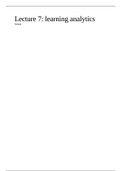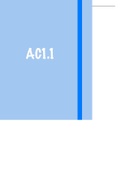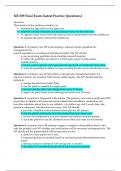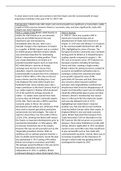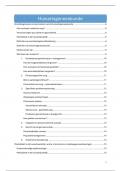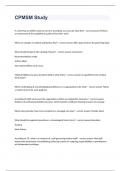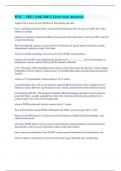Lecture 7: learning analytics
Lecture
, Learning analytics: challenges and limitations
Wilson, Watson, Thompson, Drew, Doyle
Abstract
Learning analytics: there is a need for a more explicit theorization of learning analytics.
Results:
- the relationships between learning and the digital traces left by participants in online learning are far from
trivial
- any analytics that relies on these as proxies for learning tends towards a behaviorist evaluation of learning
processes.
Keywords
Learning analytics – big data – sociomaterial – professional learning
Introduction
Learning analytics: the collection and (automated) analysis of data concerning learners’ backgrounds, behaviours
and progress using data from Learning Management Systems (LMSs). Great data banks useful for
evaluating learning theories, learner feedback and support, early warning systems, etc.
Potential enhancer or transformer of learning!
Teachers are unware of value learning analytics in practice; they are the ones that administer learners’ scores in
LMSs, but don’t really do learning analytics with it. May be since the fact that academics actually need to use/
interpret LMSs for learning analytics.
LMS: publishers of such systems provide form of data analytics (e.g. programmatic, institutional approach)
Vary in curriculum approaches used, it is questionable whether a generic approach could suit all contexts.
Whether individual learners (differentiation) can be reliably measured with the same behavioural metrics.
The rise of learning analytics
Definitions of learning analytics:
Society of Learning Analytic Research: ‘the measure- ment, collection, analysis and reporting of data
about learners and their contexts, for purposes of understanding and optimizing learning and the
environments in which it occurs’
Clow: ‘the application of ... Big Data techniques’ (684) to data including ‘demographic information,
online activity, assessment data and final destination data’ (685) to produce metrics which may be pre-
sented to student or tutor/instructor in order that they may improve their learning and teaching
respectively.
Arguments for learning analytics: personalized learning reduces delivery costs, creates more effective
learning experiences, increases competence development and collaboration (accommodates diversity of learning)
(automatized) Personalized learning allows to suggest new learning opportunities or different
courses of actions to the student by analysing their data. But, how effective is this actually? it is
suggested that the computational techniques involved are complex, varied and not always well-proven.
Such hopes, however, highlight a potential tension between personalized, individualized learning and
the collaborative, socially emergent view of knowledge underpinning (in different learning theories
(like connectivism/ constructivism).
Problematizing learning analytics
How effective are learning analytics? four potentially problematic aspects.
Conflicting findings from empirical studies
o The effectiveness of learning analytics in measuring, predicting and improving student
performance is still open to question (within empirical research).
Learning analytics and Big Data
o Big data: extremely large data sets that may be analysed computationally to reveal patterns,
trends, and associations, especially relating to human behaviour and interactions.
o (Loads of) Different types (formats) of Big Data there are automatically applicable ‘Big
Data Techniques’ that can be used to make sense of such data (big data?). But, all data have
own specialist methods for organizing and interpreting it.
Lecture
, Learning analytics: challenges and limitations
Wilson, Watson, Thompson, Drew, Doyle
Abstract
Learning analytics: there is a need for a more explicit theorization of learning analytics.
Results:
- the relationships between learning and the digital traces left by participants in online learning are far from
trivial
- any analytics that relies on these as proxies for learning tends towards a behaviorist evaluation of learning
processes.
Keywords
Learning analytics – big data – sociomaterial – professional learning
Introduction
Learning analytics: the collection and (automated) analysis of data concerning learners’ backgrounds, behaviours
and progress using data from Learning Management Systems (LMSs). Great data banks useful for
evaluating learning theories, learner feedback and support, early warning systems, etc.
Potential enhancer or transformer of learning!
Teachers are unware of value learning analytics in practice; they are the ones that administer learners’ scores in
LMSs, but don’t really do learning analytics with it. May be since the fact that academics actually need to use/
interpret LMSs for learning analytics.
LMS: publishers of such systems provide form of data analytics (e.g. programmatic, institutional approach)
Vary in curriculum approaches used, it is questionable whether a generic approach could suit all contexts.
Whether individual learners (differentiation) can be reliably measured with the same behavioural metrics.
The rise of learning analytics
Definitions of learning analytics:
Society of Learning Analytic Research: ‘the measure- ment, collection, analysis and reporting of data
about learners and their contexts, for purposes of understanding and optimizing learning and the
environments in which it occurs’
Clow: ‘the application of ... Big Data techniques’ (684) to data including ‘demographic information,
online activity, assessment data and final destination data’ (685) to produce metrics which may be pre-
sented to student or tutor/instructor in order that they may improve their learning and teaching
respectively.
Arguments for learning analytics: personalized learning reduces delivery costs, creates more effective
learning experiences, increases competence development and collaboration (accommodates diversity of learning)
(automatized) Personalized learning allows to suggest new learning opportunities or different
courses of actions to the student by analysing their data. But, how effective is this actually? it is
suggested that the computational techniques involved are complex, varied and not always well-proven.
Such hopes, however, highlight a potential tension between personalized, individualized learning and
the collaborative, socially emergent view of knowledge underpinning (in different learning theories
(like connectivism/ constructivism).
Problematizing learning analytics
How effective are learning analytics? four potentially problematic aspects.
Conflicting findings from empirical studies
o The effectiveness of learning analytics in measuring, predicting and improving student
performance is still open to question (within empirical research).
Learning analytics and Big Data
o Big data: extremely large data sets that may be analysed computationally to reveal patterns,
trends, and associations, especially relating to human behaviour and interactions.
o (Loads of) Different types (formats) of Big Data there are automatically applicable ‘Big
Data Techniques’ that can be used to make sense of such data (big data?). But, all data have
own specialist methods for organizing and interpreting it.


